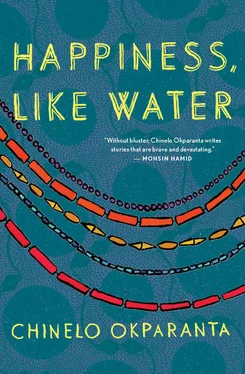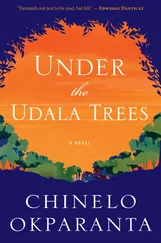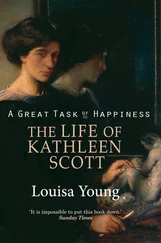She nods. ‘Very much,’ she says. ‘It pleases Mama too.’
‘Good,’ I respond. ‘Very good.’ I pick my newspaper back up, begin to unfold it.
‘It’s Friday,’ she says. ‘We have no weekend plans. Nonso, we should celebrate our engagement this weekend.’
I shake my head. ‘We should rest,’ I say. ‘Work has tired me out. We should rest.’
From the corner of my eye, I see that she is nodding slowly — hesitantly nodding her consent. ‘Okay,’ she says, reluctantly. ‘Okay.’
We stay silent for some time, and then she begins again to speak, mumbling something about how maybe I am right about rest, about how her practicum has also tired her out.
A minute goes by, maybe two. Then, ‘Actually,’ I say, ‘maybe we can have a small celebration right now.’
Ifeinwa’s eyes light up. She returns to beaming. ‘Really?’ she asks. It is the tone of hope mixed with surprise, but more than that, it is the tone of gratitude.
I nod with pity at her. ‘Yes. Really ,’ I say. I tell her that Celeste will be stopping by soon to drop off some designs. We can celebrate as soon as she arrives, just the three of us.
Her smile fades away, and her eyes grow pensive. And then she says, ‘It’s late. Past nine o’clock. Celeste will be stopping by again this late?’
‘Just to drop off plans,’ I say. ‘Not to worry. We won’t be doing any work tonight. She’s just dropping off plans. And then maybe we can celebrate this engagement of ours.’
She rises. I watch as she sets three wine glasses on the table, and I watch as she takes a bottle of wine out of the rack.
There is a painting of us on the wall by the wine rack. It was done the month after she arrived. Those were the days before she enrolled as a nursing student, before she began taking any classes at all.
We were walking along the Charles River, and there was that series of street vendors, who sat on cloths spread across the concrete, and on the grass. There were the graphic artists too, who sat spraying canisters of paint onto large canvases.
Ifeinwa pulled me to one of the graphic artists. We had no pictures of the two of us as adults, she said. And what good were the childhood pictures now? This would be better than any photograph, she said. And so we sat and allowed the vendor to spray his paint, all colours, into portraits in the images of us. She carried the canvas home.
She has just retrieved the corkscrew from the cupboard when we hear the knock on our door. I rise from the couch, and I open the door. Celeste enters, her smile wide, her eyes glowing. Her lashes are long and straight, not tightly curled like Ifeinwa’s. She breathes deeply, and I watch its effect on her chest. I step aside and allow her to come in.
Celeste goes straight to Ifeinwa in the dining room. A black leather handbag hangs down from her shoulder. In the opposite hand she carries a grey plastic tube, the designs rolled up inside. She holds on to her bag but sets the tube on the table. The cylinder rolls back and forth, just a little, before it finally settles to a stop.
Celeste takes Ifeinwa’s hand in hers. They mock-examine the ring. They laugh and they hop about like little girls in a playground, primary-school students who have been let outside for recess after lunch.
I am standing under the archway between the living room and the dining room. I observe them from there.
Ifeinwa sees me where I am standing and calls me to join them. I walk a few steps into the dining area, a few steps to one of the chairs that surround the table. Ifeinwa fills the glasses with the wine before I have taken my seat on the chair.
When we have all three taken our seats, Celeste raises her glass high and calls for a toast. I raise my glass as well, and Ifeinwa joins.
‘A long and happy marriage,’ Celeste says. It is a brief toast. Just that. But it appears to have all the power of those long, extended toasts: Ifeinwa smiles demurely and thanks Celeste in a wholehearted sort of way.
All the while Celeste, seated by my side, has already begun allowing her gaze to linger on me.
Celeste and I first met at the university, the month I arrived. We met the very first day of classes. Just a simple hello. It was August, and in Nigeria the sun would have been strong as well; and if it rained, there would have been that same scent of wet concrete.
But in Nigeria there would have been other things too: the scent of crushed millipedes. That sandy scent of snails.
I loved August in America the same way that I loved it in Nigeria, the same way that I loved the rain, and the scent of millipedes, and the scent of snails. I loved August with the same intensity with which I would eventually despise the autumn, and especially the winter — that cold, dark season that brought me to the brink of despair.
But then, there was the matter of Celeste. She was the reason that I began to love the cold: Celeste with her wide smile and pencilled-in brows. Celeste with her brassy hair. She should have been a brunette, but she had grown accustomed to dyeing. She dyed even during those early days of graduate school. Sometimes she waited too long to dye, and her natural colour crept in and threatened to blossom, like weeds on grass.
She was the reason, with her long, manicured nails, with red lipstick that made her lips shine like plastic. Buxom Celeste whose full chest appeared to do battle with the seams of her blouses. ‘They’re real,’ she’d say, back then. As if she could read my mind.
When the autumn came that first year, it was she who offered to show me a place where I could buy a coat. She did not take me to any of those little boutique stores around the university. She knew that I could not afford those.
We got on the tram, took seats by the window. I looked outside for most of the ride, afraid to speak, afraid of all the ways in which my accent could betray me.
But Celeste asked questions that forced me to speak. ‘What is Port Harcourt like?’ she asked. ‘Have you lived anywhere in Nigeria outside of there?’ She told me that she had a great uncle and a great aunt who once lived in Nigeria. In Port Harcourt, she said. GRA. Of course, that was way back then, before Independence, she said.
I asked, ‘Way back then? During the time that the colonial masters were settling in, building their mansions and their clubhouses and making servants of the Nigerians?’ They were English, but they brought with them some Americans too, I said.
I imagined GRA then, what it must have looked like during the reign of the colonial masters — devoid of rubbish heaps, a network of paved roads, estates of majestic houses with cylindrical columns marking their fronts. Houses like government buildings, with pipe-borne water and the kind of serenity that plenty of money brings. I told Celeste all this.
When I was done, Celeste shook her head slowly. ‘Sorry,’ she said, her first apology. And it was sincere.
She took me to the Salvation Army on Mass Ave. She searched through the racks with me. She used on the coats the same soothing voice she would later use on me, the kind Mama used to use on the chickens in our back yard. They’d run freely around the compound, but every once in a while, she’d choose one for stew. She’d chase it around, making those soft, cooing sounds. The chicken waddled away but eventually Mama won.
At the Salvation Army, the coats on the rack brushed against Celeste’s hands, the fabrics sliding between and around her fingers like vines crawling all over a gate.
When she found the coat, she shook it as if to air it out. She continued to shake, to get a better sense of the coat. Its sleeves writhed all around her, from the force of the shake.
She handed it over to me when she was done. A prickly heat appeared to have radiated up her face by then, rendering her cheeks red. All that fervent shaking. I observed the heat on her face, and I seemed to absorb it from her: first, I felt it in the soles of my feet, and then it crept up to my thighs. It was the strongest in my groin, and then in my chest. From my chest, it radiated up to my face.
Читать дальше












